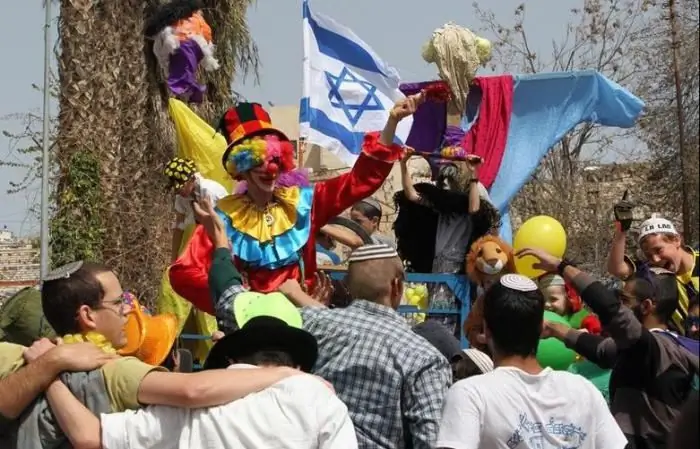2026 Author: Priscilla Miln | miln@babymagazinclub.com. Last modified: 2025-01-22 17:55:19
Mysterious and mystical, the day of Ivan Kupala is rooted in ancient times. Few people know about him today. Researchers believe that the midsummer holiday, characteristic of most pagan beliefs in Europe (an analogue of which is the day of Ivan Kupala), is one of the oldest religious cults on Earth.

At the heart of this cult is the eternal opposition and attraction of two opposite principles, unable to unite into one whole, but not existing without each other. So, heaven and earth, fire and water, man and woman are indivisible and unconnectable. This love, this attraction of opposites, is at the heart of the ancient holiday.
The ancients revered Kupala - a kind and generous god who patronized the fertility of the earth and childbearing, giving refreshing rains, bringing love turmoil into the most chaste hearts.

Initially, this day, like many other holidays of the ancient Slavs, had cosmic significance. Kupala nightcelebrated on June 25, during the summer solstice. This night was the shortest of the year and was considered special.
The ancient Slavs believed that on Kupala night the line between the obvious (real) and Navi (mystical) worlds became thinner, and all the dark gods and spirits could penetrate the world of people. On this night, medicinal herbs gained tremendous healing power, intoxicating wines were more intoxicating than usual, but most importantly, the magical adonis blossomed - a fern flower that reveals secrets, gives wisdom and leads to unearthly treasures of those who can get it. The search for this flower was given special attention during the celebration.
But the main event of Kupala Night is the wedding. The newlyweds are Lelya and Yarilo, young lovers who are not destined to be together, because they are each other's brother and sister. The girls chose a low birch or willow and dressed it up as a “bride”, decorating it with colorful ribbons, while the guys at that time made a straw “groom”. The wedding ceremony was accompanied by traditional singing and dancing, as was the wedding itself.
Believing in the power of fire and water, after sunset, the ancient Slavs jumped over the cleansing Kupala fire, and at dawn they washed themselves with dew and swam in the rivers. It was believed that the clothes in which a person jumped over a fire and bathed became protective and acquired the ability to protect its owner from the evil eye and ailments. Another water-related part of the holiday is the launching of wreaths on the water. From these wreaths floating in the dark, unmarried girls wondered about their future fate.

Information about the possible specific dishes of this holiday, unfortunately, has not been preserved. But we can confidently assume that, according to the Slavic hospitable tradition, the treat was plentiful and generous. And on this day, they began to drink surya - a ritual Slavic drink, which was prepared from honey and herbs, and then infused for several months in sheepskins buried in the ground.

With the advent of Christianity in Russia, like many other pagan traditions, this holiday was banned, but not forgotten. For many centuries, young people gathered in glades near water bodies, sang songs and burned fires, praising the good god Kupala and asking him for a harvest and offspring.
However, along with the ancient gods, Orthodox saints were also revered in Russia. And Kupala Night, like other holidays, soon acquired church features. And Kupala himself received the name Ivan - in honor of the Orthodox Saint John the Baptist. And so the name of the holiday appeared, which is widespread today - the day of Ivan Kupala. However, the original date has been moved to July 7th. This is connected not only with the overlapping of pagan and Orthodox cults, but also with the transition of Russia to the Julian calendar.
The night before Ivan Kupala, as in ancient times, is considered magical. It is at this time that miracles happen. Like many centuries ago, today's youth celebrates the day of Ivan Kupala, welcoming the warm summer with cheerful songs about love, prosperity and a rich harvest, and lovers, wanting to keep theirfeelings jump over Kupala bonfires, as did their distant ancestors.
Recommended:
Feast of Ivan Kupala: history, traditions and customs. Signs on Ivan Kupala

Celebrate it began in the hoary pagan antiquity. Among the Eastern Slavs, it fell on the day of the summer solstice on June 24th. But after the introduction of the Gregorian calendar, the date shifted to July 7th. Celebrations and rituals of Ivan's Day necessarily include three main components: fire, water and herbs
Ivan Kupala Day: traditions of celebration among the Slavic peoples

Ivan Kupala Day is one of the most beloved Christian-Slavic holidays. On the eve, on the night before Ivan's Day, folk festivals were held with many rites, ritual actions and games
20 October: Cook's Day, International Air Traffic Controller's Day, Military Communications Day in Russia

Unfortunately, under the influence of the masquerade on October 31, held under the auspices of fear and horror, we forgot about many other holidays that are much more fun and close to us historically and in spirit. Take, for example, October 20. You will be surprised, but there are many reasons to celebrate this day, if you wish, having a theme party
Purim holiday - what is it? Jewish holiday Purim. History and features of the holiday

Jewish holidays for people who are not connected with the culture of this people seem to be something incomprehensible, mysterious and at the same time attractive. What are these people happy about? Why are they having so much fun? For example, the Purim holiday - what is it? From the outside, it seems that the participants in the celebration are so happy, as if they had just escaped some kind of big misfortune. And this is true, only this history is already 2500 years old
October 22 is the holiday of "White Cranes". History and features of the holiday

October 22 is the White Cranes Festival. This is an event of solidarity and honoring the memory of soldiers who did not return. The symbol of the crane, as the personification of the souls of dead warriors, rising up. As a symbol of infinity and purity

